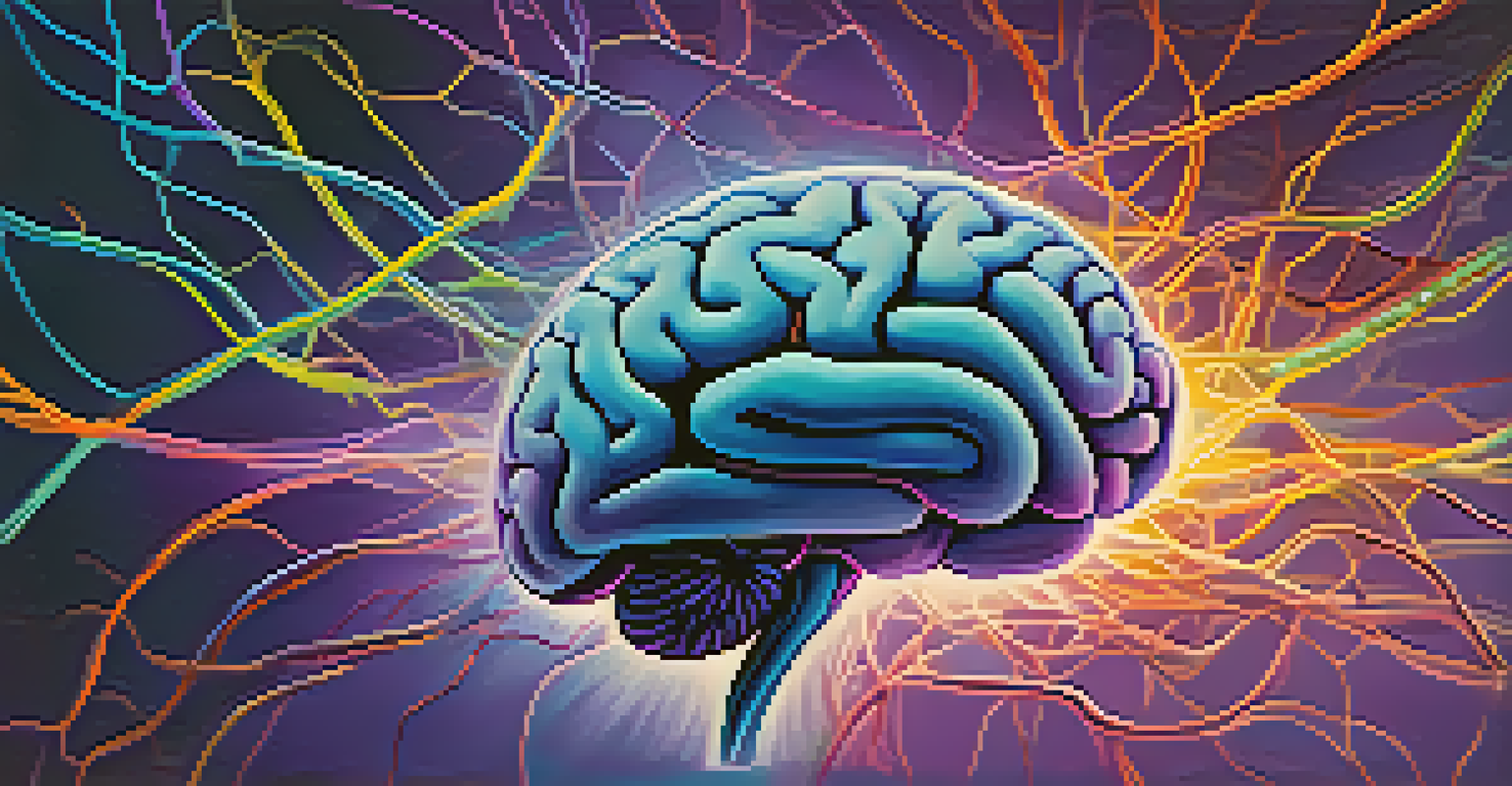Research Trends: Current Studies on Psychedelics in Medicine

The Resurgence of Psychedelics in Medical Research
In recent years, psychedelics have made a surprising comeback in medical research. Once stigmatized and largely banned, substances like psilocybin and MDMA are now being studied for their therapeutic potential. This shift is fueled by a growing body of evidence suggesting these compounds can effectively treat conditions like depression, PTSD, and anxiety.
Psychedelics are not just drugs; they are tools to unlock the potential of the mind and spirit.
Institutions such as Johns Hopkins University and MAPS (Multidisciplinary Association for Psychedelic Studies) have been at the forefront of this movement. Their rigorous studies highlight not only the efficacy of these substances but also their safety when used in controlled environments. As public perception shifts, funding and institutional support for psychedelic research are also increasing.
This resurgence is reminiscent of the early days of cannabis research, where initial skepticism gave way to a burgeoning industry. As we navigate this new frontier, it's vital to approach these studies with an open mind, recognizing the potential benefits that psychedelics could offer to mental health treatment.
Psychedelics in Treating Depression and Anxiety
One of the most promising areas of psychedelic research is in treating depression and anxiety. Traditional treatments often come with a slew of side effects and may not work for everyone. In contrast, studies have shown that psychedelics like psilocybin can produce rapid and lasting improvements in mood, with some participants reporting significant changes after just one session.

For instance, a study conducted by researchers at Johns Hopkins found that participants with major depressive disorder experienced a significant reduction in symptoms after receiving psilocybin in a controlled setting. This highlights a crucial difference: the therapeutic context in which these substances are used can greatly influence their effectiveness.
Psychedelics Show Promise in Therapy
Research indicates that substances like psilocybin and MDMA can effectively treat conditions such as depression and PTSD.
As research continues, it's essential to explore how psychedelics may offer an alternative to conventional treatments. This could pave the way for new therapies that are more effective and have fewer side effects, ultimately transforming the landscape of mental health care.
MDMA Therapy for PTSD: A Game Changer?
MDMA, commonly known as ecstasy, is being investigated for its potential to treat post-traumatic stress disorder (PTSD). In clinical trials, participants have reported profound emotional breakthroughs and a significant reduction in PTSD symptoms after just a few sessions. This has sparked interest in MDMA-assisted psychotherapy as a viable treatment option.
The therapeutic use of psychedelics offers a radical change in how we approach mental health treatment.
The therapeutic process typically involves guided sessions where patients can confront traumatic memories in a supportive environment. This combination of psychotherapy and the unique effects of MDMA seems to unlock emotional barriers, allowing individuals to process their experiences more effectively. The results are promising, with many participants experiencing long-term relief from their symptoms.
As we delve deeper into MDMA therapy, it's crucial to consider how this approach could reshape the treatment of PTSD. With millions affected by this condition worldwide, the potential for MDMA to offer hope and healing is a significant development in the field of mental health.
The Role of Psychedelics in Addiction Treatment
Psychedelics are also emerging as potential tools in the fight against addiction. Studies suggest that substances like ayahuasca and psilocybin may help individuals break free from the grips of addiction by facilitating profound personal insights and enhancing emotional resilience. This could be particularly beneficial for those struggling with substance use disorders.
For example, a study published in the Journal of Psychopharmacology found that participants who underwent psilocybin therapy reported a significant reduction in their cravings for nicotine. This demonstrates how psychedelics might help disrupt addictive patterns by fostering a deeper understanding of one’s relationship with substances.
Ethics Are Crucial in Psychedelic Research
As psychedelics gain acceptance, maintaining ethical standards in research is vital to ensure safety and integrity.
As more research unfolds, the prospect of utilizing psychedelics in addiction treatment becomes increasingly realistic. This could lead to innovative therapies that address the root causes of addiction rather than merely alleviating symptoms.
Exploring the Science Behind Psychedelics
Understanding how psychedelics work in the brain is a critical aspect of current research. These substances primarily affect serotonin receptors, particularly the 5-HT2A receptor, which plays a role in mood regulation and perception. This interaction is believed to contribute to the profound changes in consciousness that users experience.
Recent neuroimaging studies have shown that psychedelics can lead to increased connectivity between different brain regions. This enhanced communication may allow individuals to access new perspectives and insights, which can be particularly therapeutic in a clinical setting. It’s like rebooting a computer, allowing your brain to reset and reorganize its thoughts.
As we deepen our understanding of the neurobiology behind psychedelics, we can refine therapeutic approaches and maximize their benefits. This scientific exploration not only demystifies these substances but also paves the way for their responsible use in medicine.
Ethical Considerations in Psychedelic Research
With the resurgence of interest in psychedelics, ethical considerations are paramount. Ensuring that research is conducted responsibly and safely is crucial, especially given the historical misuse of these substances. Researchers must navigate issues related to informed consent, potential risks, and the psychological impact of these experiences on participants.
Moreover, as psychedelics move closer to mainstream acceptance, there is a risk of commercialization that could undermine their therapeutic potential. It’s essential to maintain a focus on the patient experience and prioritize safety over profit. This requires a collaborative effort among researchers, regulatory bodies, and healthcare professionals.
Future of Psychedelics Looks Bright
Ongoing studies may lead to innovative therapies for various conditions, expanding the role of psychedelics in medicine.
As we advance in this field, establishing ethical guidelines will be key to ensuring that the benefits of psychedelics are realized without compromising safety or integrity. This approach will help foster trust in psychedelic research and its applications in medicine.
Future Directions: What Lies Ahead for Psychedelics?
Looking ahead, the future of psychedelics in medicine is filled with potential. Ongoing research is likely to explore a wider range of conditions, including chronic pain, existential distress in terminal illness, and more. This could lead to groundbreaking therapies that address unmet medical needs.
Additionally, as public awareness and acceptance grow, there may be shifts in regulations that allow for more widespread clinical use of psychedelics. This could foster an environment where innovative therapies can flourish, benefiting patients who currently lack effective treatment options.

However, it’s essential to approach this future with caution and responsibility. Continued research, ethical considerations, and a focus on patient safety will be fundamental in ensuring that the promise of psychedelics is realized in a way that benefits all.